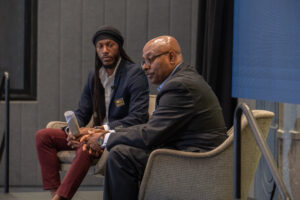Community members and business leaders attended the May 19 Transform Westside Summit to learn about Atlanta Housing’s work on the Westside. The morning opened with connection and community building, where members of the audience shared resources for the group’s collective efforts to improve the Westside. Jerry McGaughy, Real Estate Development Director at Quest CDC, led the devotion.
Eugene E. Jones Jr., president and chief executive officer, Atlanta Housing, and author of the book “Housing Humans,” gave an overview of the organization’s work and the importance of partnerships to further the mission of true affordability in the city.
Organizational Highlights
“At the end of the game, homeownership is what we need to get to. How do we get there? That’s probably Atlanta Housing’s biggest attribute; we have the best robust homeownership program across the country. It beats New York; it beats Chicago; it beats L.A.”
- In the next year, Atlanta Housing expects to have 1,800 affordable units available
- In the fall, Atlanta Housing plans to host a developers conference to inform leaders on the developments going on in the city and the opportunities to build affordable housing. The goal is to reach 20,000 units
Innovative Projects
“I’m telling you right now, across the country, Atlanta is a place to go, not just because of the economic opportunity, but the affordable housing and the visibility of things being done right. You are very innovative here in the city of Atlanta.”
- Herndon Homes
– Senior living in a historically black neighborhood with the intention of retaining Legacy residents
– Getting ready for phase two. Lidl, a grocery store, committed to open on the property - Modular homes
– Self-developed, strictly for home ownership
– Plan to build a smaller unit next to the proposed house that homeowners can rent the unit out to family members and pay down their mortgage with the profit - Bowen Homes
– Atlanta Housing recently applied for a $40 million Choice Neighborhood grant from the U.S. Department of Housing and Urban Development (HUD) to redevelop the site
– Optimistic they are going to get the grant, but plan to move forward with the redevelopment even if they don’t because it’s the right thing to do
– Want to ensure those who used to live in Bowen Homes have an opportunity to come back to the neighborhood - Scholar’s Landing
– Getting ready to do another phase, Roosevelt Hall
– Grand opening June 16, 2023
– First floor includes retail space, a computer center and library
– Second floor will house the Atlanta Housing Choice Neighborhood team and AUC Consortium, including staff from Clark, Morehouse, Spelman, and the Morehouse School of Medicine
Audience Questions
- My question deals specifically with the disability community and percentage of housing. When I last asked about it, I was told two to three percent. Has that number changed and what efforts are being done to improve it?
From the HUD requirement, it’s only two to four percent. At Atlanta Housing, we try to do more than that. The model homes previously mentioned have some ADA accessible units.It’s not just wheelchair accessible, it’s also sight and hearing impaired. When we start building Civic Center, Inglewood, Thomasville, we’re going to do a lot more than before. - When you look back to when Atlanta Housing bulldozed Perry Homes and rebuilt West Highlands, what are the things that you feel like they got right and what are some things they could have done differently? I think they learned a lot with West Highlands. No one wants a development to be torn down, but no one wants a development to stay up and create crimes. I think it gave us a platform and a model that we can replicate, tweak and do better at other developments we have around the city.
- In terms of the number of affordable units Atlanta Housing Authority was able to provide in its heyday, what will you be able to provide in the future? Those numbers are never going to come back to where we were back in the 90s. Back in the day, HUD was fully funded. We had many different programs to fund all these different social activities. When it comes to social services, the programs are gone right now. Every time we go to Congress for appropriations, we have to beg for our money. There’s no other federal government agency that goes through a budget year that has to beg for their money like HUD.
- What one thing can we do to help you do more? I need you to come into the fold and be ambassadors when it comes to resources to get these developments and to help developers create affordable housing. I need you to know what we know and what we do. A lot of people don’t understand the complexity of what we have to go through. I need you to understand what we go through so you can explain to the neighborhood and the community that we’re doing everything we can, but here are the issues and roadblocks. Once you get that word out, it will make our jobs a lot easier.
Miss the event? Watch the full Transform Westside Summit on YouTube.

